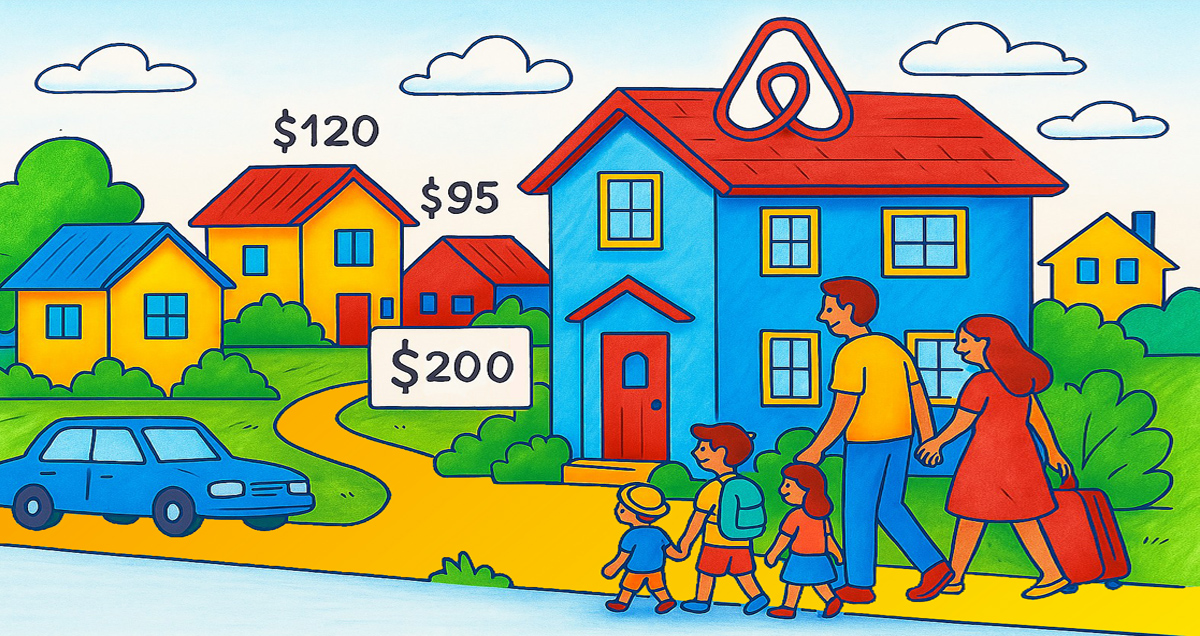Short-term rentals have become a major part of the Australian accommodation market, particularly through platforms like Airbnb and Stayz. However, as governments respond to housing shortages and concerns about tax compliance, new regulations and levies are emerging. One such measure is the Airbnb tax, a term widely used to describe the taxation of short-term rentals in Australia.
This guide explains the Airbnb tax, including its history, when it applies, how it is paid, exemptions, criticisms, and what landlords and investors need to know to remain compliant.
A Brief History of the Airbnb Tax in Australia
The taxation of short-term rentals in Australia has evolved alongside the rise of platforms like Airbnb. Initially, the Australian Taxation Office (ATO) required hosts to declare rental income under standard tax rules. However, as short-term rentals grew in popularity, concerns arose about their impact on the housing market and tax compliance.
To address these issues, some states introduced specific levies and stricter regulations. The most notable example is Victoria’s 7.5% Airbnb tax, which applies to short-term rental bookings from January 1, 2025. Other states, including New South Wales, Queensland, and Tasmania, have also introduced or proposed various measures.
When does the Airbnb Tax Apply?
If you rent out a property or a portion of it for short-term stays (typically under 28 days), the income is taxable. This applies to:
- Entire Property Rentals – Renting out a full property for short-term stays, whether through a digital platform or private agreements.
- Partial Property Rentals – Renting out a room while continuing to live in the property, regardless of whether it’s listed on a platform.
- Multiple Property Listings – Owning and renting out multiple properties on platforms like Airbnb and Stayz or through private arrangements.
- Direct Bookings – Even if you rent out your property privately, through personal networks, or via direct advertising without using a platform, the income is still taxable and must be declared.
In states like Victoria, the Airbnb tax specifically applies to short-term rental platforms, meaning guests will see an added cost on their bookings.
The 7.5% levy is generally paid by the guest. When bookings are made through a digital platform such as Airbnb or Stayz, the platform adds the levy to the total price and remits it directly to the government. In this case, the host does not handle the payment process.
If the booking is made privately and not through a platform, the host is responsible for collecting the levy from the guest and remitting it to the Victorian State Revenue Office. Failure to do so may result in penalties. However, even if your state does not have a dedicated levy, your short-term rental income is still subject to income tax.
The Victorian government has stated that revenue from the Airbnb tax will be used to support housing affordability initiatives. This includes funding the construction of new social and affordable housing and providing assistance to first-home buyers.
State-by-State Overview
Victoria
Victoria’s 7.5% Short Stay Levy came into effect on 1 January 2025. It applies to bookings of less than 28 days on short-term rental platforms. The levy is calculated on the total booking amount, including cleaning fees and GST. Exemptions apply to hotels, motels, caravan parks, and a host’s primary residence. In addition, local councils and owners’ corporations now have the power to impose their own restrictions, such as capping the number of nights a property can be rented or banning short-term rentals in certain buildings or areas.
New South Wales
NSW has not yet implemented a levy but is actively reviewing its short-term rental accommodation (STRA) framework. Proposals under consideration include the introduction of a levy similar to Victoria’s, annual caps on rental nights, and enhanced powers for strata bodies to regulate STRA within apartment buildings. As of June 2025, these remain under consultation.
Queensland
While Queensland has not implemented a specific Airbnb tax, recent rental law reforms effective 1 May 2025 could impact landlords who switch between long-term and short-term rental markets. These changes include standardised tenancy forms and stronger privacy protections for tenants. No direct levy on short-term rentals exists yet, but further regulation is possible.
Tasmania
Tasmania has proposed a 5% short-stay levy to fund first-home buyer programs. However, the implementation has been delayed. The government is observing the effects of Victoria’s model before moving forward. As of June 2025, no levy has been introduced.
How Is the Airbnb Tax Paid?
There are multiple ways in which the Airbnb tax is accounted for and paid:
- Declaring Rental Income – All earnings from short-term rentals must be reported in your annual tax return.
- Claiming Deductions – Expenses related to rental income (such as maintenance, cleaning, property management fees, and mortgage interest) can be deducted to lower taxable income.
- Capital Gains Tax (CGT) Considerations – If you rent out part of your primary residence for short-term stays, you may lose full CGT exemption when selling the property. The portion used for income-generating purposes could be subject to CGT, calculated based on the area rented and the rental period.
In Victoria, the 7.5% Airbnb tax will be automatically applied to guests’ bookings on short-term rental platforms, with operators responsible for collecting and remitting the levy.
Who Is Exempt from the Airbnb Tax?
Certain exemptions apply to short-term rental taxation, including:
- Primary Residence Rentals – If you rent out your home occasionally for short-term stays (e.g., while on holiday), income still needs to be declared. However, tax obligations may vary depending on the frequency of rentals and whether the property remains your primary residence.
- Non-Commercial Arrangements – If you rent out your property to family or friends at below-market rates, you still need to declare the income. However, you can only claim deductions up to the amount of rent received, meaning excess expenses cannot be deducted.
- Traditional Hotels and Motels – Victoria’s 7.5% levy does not apply to hotels, motels, and caravan parks.
- Long-Term Rentals – If a guest stays for 28 days or more, it may not be subject to the short-term rental levy.
Criticism and Calls for Reform
The Airbnb tax has sparked ongoing debate among policymakers, investors, and the public. Supporters argue that it could help ease housing pressure by reducing the number of properties diverted to short-term rentals, especially in areas with limited rental supply. However, the levy was applied uniformly across all of Victoria, not just in regions with housing shortages. This blanket approach has raised concerns that it unfairly affects areas where short-term rentals have minimal impact on local housing availability.
Critics say the tax adds financial pressure on small-scale property investors and pushes up costs for travellers, particularly families and those on tighter budgets. They also point out that the compliance burden may deter occasional hosts who rely on short-term rentals for supplemental income.
Proposals for reform include exempting part-time hosts or applying a tiered structure based on frequency of rental use. These suggestions aim to balance government objectives with the practical realities faced by property owners and short-term guests.
How Digital Platforms Are Responding
Platforms like Airbnb, Stayz, and Vrbo play a central role in enforcing and adapting to the Airbnb tax. Key platform features include:
- Automated Tax Collection – In Victoria, platforms will automatically apply the 7.5% levy to guest bookings.
- Income Reporting – Many platforms offer hosts tools to track income and expenses for tax compliance.
- Regulatory Updates – Hosts receive notifications on changing tax laws through platform dashboards.
Understanding how these platforms operate can help landlords navigate the taxation process smoothly.
How to Stay Compliant as an Airbnb Host
To ensure you meet your tax obligations and avoid penalties, follow these best practices:
- Keep Detailed Records – Track income, expenses, and occupancy dates.
- Use Accounting Software – Tools like Xero and MYOB can simplify tax calculations.
- Understand Your State’s Laws – Stay updated on local short-term rental levies.
- Consult a Tax Professional – A tax advisor can help optimise deductions and compliance. Engaging a qualified accountant, such as our firm, ensures you understand your obligations and make the most of the available tax benefits.
The Future of the Airbnb Tax in Australia
With Victoria leading the way with its 7.5% Airbnb tax, other states may follow suit. NSW is actively considering similar legislation, Tasmania’s plan is on hold, and Queensland is watching developments closely. Investors and landlords should monitor changes closely and plan accordingly.
While the Airbnb tax adds an extra layer of cost and complexity, especially for individual investors and everyday travelers, staying informed and compliant is the most practical step forward. Understanding your obligations allows you to navigate the system more effectively and helps you make the most of short-term rental opportunities.








